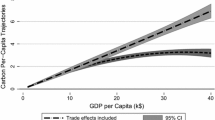Abstract
It is common for studies on trade and environment issues to model trade patterns as driven by environmental considerations. Under conditions of trade liberalization, these studies predict the rise of pollution havens and an increase in global pollution. The extant empirical literature, however, gives only mixed support at best for the notion that trade patterns are influenced by environmental issues. We develop a simple model to investigate whether trade based on traditional comparative advantage may lead to increased global pollution. We find that trade may lead to increased global pollution if both trading nations exhibit increasing marginal disutilities of pollution.
Similar content being viewed by others
References
Baldwin, Robert E. (1984) “Trade Policies in Developed Countries.” In Handbook of International Economics. Amsterdam: North-Holland, 571–619.
Baumol, W. and W.E. Oates (1988) The Theory of Environmental Policy. Englewood Cliffs, NJ: Prentice Hall.
Birdsall, Nancy and David Wheeler (1992) “Trade Policy and Industrial Pollution in Latin America: Where are the Pollution Havens.” In Patrick Low (ed.), International Trade and the Environment. World Bank Discussion Papers. Washington, DC: World Bank.
Chichilinsky, Graciela (1994) “North-South Trade and the Global Environment.” American Economic Review 84:851–874.
Copeland, Brian R. and M. Scott Taylor (1994) “North-South Trade and the Environment.” Quarterly Journal of Economics 109:755–787.
Copeland, Brian R. and M. Scott Taylor (1995) “Trade and Transboundary Pollution.” American Economic Review 85:716–737.
Dean, Judith M. (1992) “Trade and The Environment: A Survey of the Literature.” In Patrick Low (ed.), International Trade and the Environment. World Bank Discussion Papers. Washington, DC: World Bank.
Eskeland, Gunnar S. and Ann E. Harrison (1997) “Moving to Greener Pastures? Multinationals and the Pollution Haven Hypothesis.” Mimeo. Washington, DC: World Bank.
Grossman, Gene M. and Alan B. Krueger (1993) “Environmental Impacts of a North American Free Trade Agreement.” NBER Working Paper, No. 3914.
Grossman, Gene M. and Alan B. Krueger (1995) “Economic Growth and the Environment.” Quarterly Journal of Economics 118:353–378.
Leonard, H. Jeffrey (1998) Pollution and the Struggle for World Product. Cambridge: Cambridge University Press.
Lucas, Robert E.B., David Wheeler, and Hemamala Hettige (1992) “Economic Development, Environmental Regulation and the International Migration of Toxic Industrial Pollution: 1960–1988.” In Patrick Low (ed.), International Trade and the Environment. World Bank Discussion Papers. Washington, DC: World Bank.
Mani, Muthukumara, Sheoli Pargal, and Nainul Huq (1996) “Does Environmental Regulation Matter? Determinants of the Location of New Manufacturing Plants in India in 1994.” Working paper.
McGuire, Martin C. (1982) “Regulation, Factor Rewards and International Trade.” Journal of Public Economics 17:335–354.
Pearson, Charles (1985) Down to Business: Multinational Corporations, the Environment, and Development. Washington, DC: World Resource Institute.
Pearson, Charles (1987) Multinational Corporations, Environment, and the Third World. Durham: Duke University Press.
Pethig, Rüdiger (1976) “Pollution,Welfare, and Environmental Policies in the Theory of Comparative Advantage.” Journal of Environmental Economics and Management 2:160–169.
Robison, H. David (1988) “Industrial Pollution Abatement: The Impact on Balance of Trade.” Canadian Journal of Economics 21:187–199.
Siebert, Horst (1977) “Environmental Quality and the Gains from Trade.” Kyklos 30:657–673.
Tobey, James A. (1990) “The Effects of Domestic Environmental Policies on Patterns of World Trade: An Empirical Test.” Kyklos 43:191–209.
Walter, Ingo (1982) “Environmentally Induced Industrial Relocation to Developing Countries.” In S.J. Rubin and T.R. Graham (eds.), Environment and Trade. New Jersey: Allanhead, Osmun and Co.
Yohe, Gary W. (1979) “The Backward Incidence of Pollution Control-Some Comparative Statics in General Equilibrium.” Journal of Environmental Economics and Management 6:187–198.
Author information
Authors and Affiliations
Rights and permissions
About this article
Cite this article
Lehr, C.S., Maxwell, J.W. Comparative Advantage, Trade, and Transboundary Pollution. Open Economies Review 11, 205–227 (2000). https://doi.org/10.1023/A:1008370706461
Issue Date:
DOI: https://doi.org/10.1023/A:1008370706461




